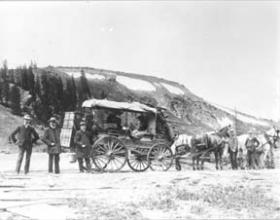The original Grand County contained North Park as well as Middle Park, and during the mining boom of the early 1880's there were several mining camps east of the modern town of Rand. It was several years after the mining boom northern area of Jackson County was created.
Teller City was founded in 1879 and named for Colorado's famous Senator Henry M. Teller, who later became U.S. Secretary of the Interior. By 1882, the population of Teller City was about 1200. It had a fine hotel with 40 rooms, a newspaper and two steam saw mills. It was a lively Old West town with twenty seven saloons and a number of "houses of ill repute".
Some high quality ore assayed at Teller City was as much as $3000 a ton, but most of that soon ran out and by 1884, the high shipping costs to far away smelters dropped the price per ton dropped to $20. The best mine, Endomile, was three miles from town.
Crescent City, southwest of Teller City had an even more brief existence, but there was population enough for a U.S. Post Office in 1880.
Rumors of valuable silver three miles sough of Teller City drew a number of prospectors to found the camp known as Tyner. John Noble Tyner was the First Assistant Postmaster General of the United States and visited the mining camp so named in 1879. He promised the miners a weekly mail delivery if at least 2 miners mined through the winter. Tyner had been a special agent for the Post Office from 1861 thru 1868, at which time he was appointed to serve in an open seat in the U.S. House of Representatives for Indiana. He ran for election win the appointed term ended and was elected and continued to be reelected and serve as a Representative until 1875 when President Grant appointed him Second Assistant Postmaster General. Grant would later appoint him to the "big job" of Postmaster General in 1876.
Tyner worked to elect Rutherford B. Hayes in 1876 and after Hayes was elected and took office in March of 1877, Hayes appointed a new Postmaster General, but gave the second spot, First Assistant to the Postmaster General to Tyner. Historians suggest that Tyner's demotion angered him to the point that he allowed wide spread corruption in the day to day operation of the Postal Service which was his responsibility to over see. He resigned in 1881 under great public pressure from what became known as the "Star Route Fraud scandal". He would remain a political figure being appointed various positions with the U. S. Postal Service until shortly before his death in 1904. Although indited three times for corruption in his Post Office management, he was never convicted. The "Star Route Fraud scandal", may have local implications. It had to do with over charging and providing needless postal routes, roads and post offices and kick backs to politicians from contractors .
Perry Eberhart, Guide to the Colorado Ghost Towns, Sage Books, Denver, 1959
Colorado Miner Magazine









